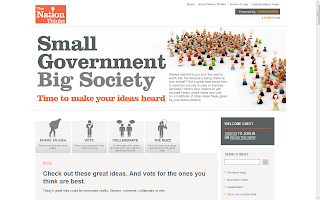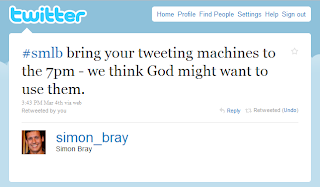>Sorry that this has taken so long to emerge and you’ll have to forgive that it is no longer as directly attributed as I might have liked. So, it may be less a report of the session and drift into a discussion of the themes…
This session was hosted by Rob Wilmot who wanted to talk about how we could harness the wisdom of crowds in the work that we do. He showed off Nation Thinks which asks people to contribute their ideas to the budget and then to either vote up or vote down the responses. Sites like MyStarbucksIdea.com are the inspiration for it and this is that idea writ large for the very act of governance on a national level.
We started off with our doubts. Aren’t we all already over consulted? How on earth do you manage to differentiate between what is noise and what is of value? Isn’t encouraging the crowdsourcing of opinion dangerous? After all, newspaper polls generally suggest that the crowdsourcing of criminal justice policy would result in reintroducing capital punishment? And we forget Godwin’s law at our peril
As an online discussion grows longer, the probability of a comparison involving Nazis or Hitler approaches 1
Emma Langman suggested that it was possible to crowdsource arguments and connect their dots to maintain credibility. She flagged up Cohere, a project from the Open University that helps to visualise the thread of an argument and cite wildly different sources in a way that allows cases to be assessed on their merits and sources to be verified. She argued that it is in the divergent opinions that crowdsourcing finds its beauty. Too often we are encouraged to fall in to a particular way of thinking and to follow the crowd. Can crowdsourcing present an opportunity to change that?
There’s probably a lot of us who went to LGCYH because we want to find those divergent opinions and get stuck into them. Understanding conflict is something that in general we don’t do very well and we try to hide from. Crowdsourcing has the potential to shine a giant light onto those disagreements and we don’t much like that so it’s inevitable that it isn’t coming to us naturally.
But crowd sourcing isn’t just about ideas, it’s about gathering data and information too as we saw in the way that The Guardian treated the expenses scandal. We shouldn’t forget that it’s also about being able to make a personal contribution to seeing change take place. Chris Taggart very wisely pointed out that the act of self-organising used to be really hard but the tools are there for people to get something off the ground very quickly.
Sites like What Do They Know simplify the act of making Freedom of Information requests whilst publishing them to give everyone access. The internet has changed our expectations: 28 days for a response used to be fine, but we find it possible to get almost instantaneous tweet. The pre-internet age restricted dialogue to letters, now rather than single, direct answers we offer open and transparent conversations that can be accessed by anybody. I think what the state of Texas has done with GetSatisfaction is excellent and the open discussion and publication of ideas, questions, problems and even praise it offers can build into an excellent resource for the public and a much cheaper access channel for the state.
So can the #opendata movement help local government to move beyond the numerical to seeing dramatic shifts in organisational culture? Emma Langman had seen her sister driven to ask her council for the process maps relating to a particular issue and that raised the question of why our default position isn’t to put those maps somewhere accessible for people to understand what exactly happens when they report a problem, or request a service. There’s very little to be gained by shrouding the act of doing local government in mystery.
There’s also very little point in just publishing data believing that it equates to transparency. The thirst for transparency needs us to think about how we use crowd sourcing tools and practice to make consultation, data providing, wisdom gathering and idea generating more meaningful. Successfully doing that necessitates it to be rooted in a culture that is open to the things it flags up, or that seeks to build on, or feed into, the personal contribution of others. It’s the implications, not the technology.


